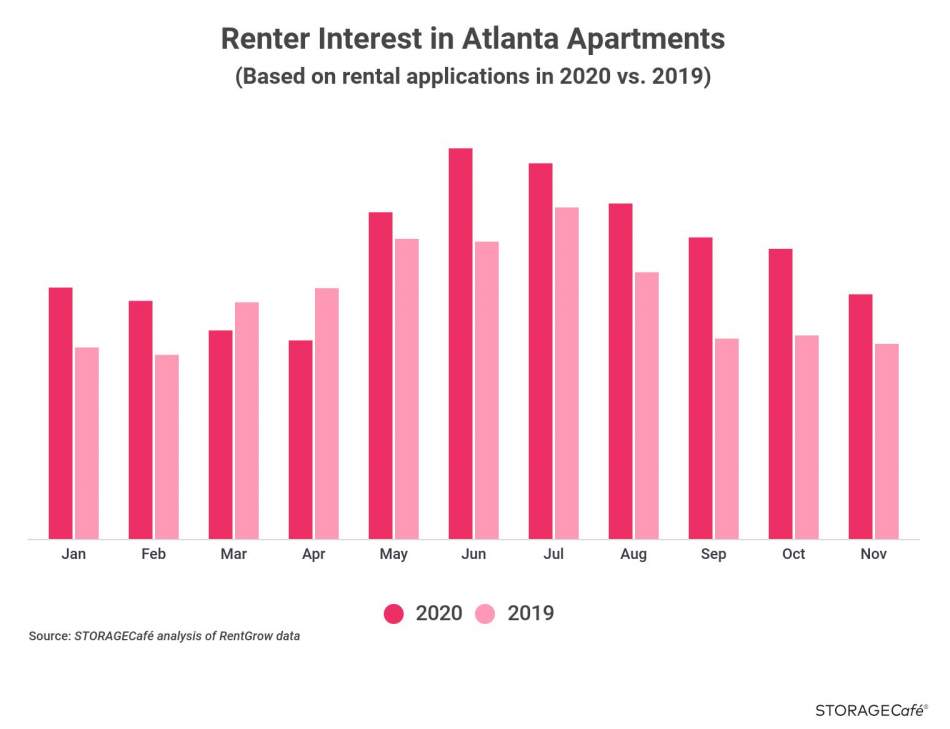Remember a year ago when the COVID-19 pandemic was supposed to decimate the real estate industry, cause everyone to stay put in their current living situation, and then, later, spell the end of American cities by way of frantic deurbanization?
Data pertaining to the Atlanta market have proven early prognosticators wrong.
Sales in 2020, in fact, smashed records for Georgia MLS, with more recent trends showing the metro Atlanta market still on fire, for better (sellers) or worse (frustrated house-hunters). Pew Research has shown about 22 percent of U.S. adults have either moved during the COVID-19 pandemic or know someone who has.
Now a study suggests that renting activity in the City of Atlanta spiked over 2019 levels once the lockdown months subsided—and that the majority of new renters in the city actually came from the suburbs. (Rising suburban rents could be a culprit, but Atlanta was also unique among major cities in that average rents actually increased in 2020, up 4 percent through this March.)
 That’s a key takeaway from the most recent mobility report by StorageCafé, a national self-storage search website that’s part of Yardi software. They analyzed 1.7 million renter applications nationwide to get a handle on renter migration patterns in 2020.
That’s a key takeaway from the most recent mobility report by StorageCafé, a national self-storage search website that’s part of Yardi software. They analyzed 1.7 million renter applications nationwide to get a handle on renter migration patterns in 2020.
The City of Atlanta ranked only 17th for the number of total renter applications in doomsday 2020 (the top spot went to Los Angeles, where 60 percent of people made an in-state move), but local renting activity was significantly ahead of 2019 from May on, the analysis found.
The top cities for renters coming to Atlanta from other states were New York City, followed by Chicago and Charlotte. But the majority—64 percent—of new renters in ATL had already been living somewhere else in Georgia.
The bulk of those, or 57 percent, were surprisingly from suburban areas. (Apologies, Decatur, but researchers included the DeKalb County seat as the second most frequent originating city among that data). The top city for inbound Atlanta renters in 2020 was Marietta. With Smyrna in third place, per StorageCafé’s findings.
Buckhead was the most popular destination for relocators seeking more spacious homes, with the Cumberland area within city limits landing at second. Almost half of renters uprooting to Atlanta applied in those two places.
 Buckhead was Atlanta's most popular destination in 2020 for renters seeking more spacious digs, per a recent study of nearly 2 million rent applications. Brett Bamhill/Shutterstock
Buckhead was Atlanta's most popular destination in 2020 for renters seeking more spacious digs, per a recent study of nearly 2 million rent applications. Brett Bamhill/Shutterstock
Drilling down, the data show that millennials were the bulk of new renters in the city (57 percent), and about half of inbound renters overall earn between $30,000 and $65,000 annually. One-third of them, meanwhile, pull in $65,000 to $100,000 per year, or more.
Reliable population trend stats for 2020 is still hard to come by. But Atlanta’s relative attractiveness, per the analysts, could be attributed to unemployment rates plummeting by six points between April and December, and the city’s “comfortable” average apartment size of 954 square feet.
“Atlanta is definitely a relocation option,” they wrote, in summary, “to be taken into consideration.”
• Atlanta listed among 'top 10 cities to live in after the pandemic' (Urbanize Atlanta)






